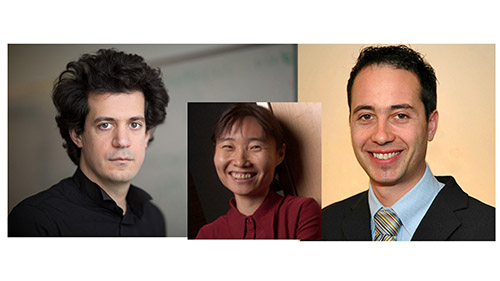Three EECS professors receive Faculty Research Innovation Fellowships (FRIFs)

Pictured above, L to R: Professors Constantinos Daskalakis, Jing Kong, and Luca Daniel
EECS Staff
EECS has awarded Faculty Research Innovation Fellowships (FRIFs) to Professors Luca Daniel, Constantinos Daskalakis, and Jing Kong.
Daskalakis received a Frank Quick Faculty Research Innovation Fellowship, created through the generosity of EECS alumnus Frank Quick ’69, SM ’70. Daniel and Kong received Thornton Family Faculty Research Innovation Fellowships, created through the generosity of Richard Thornton, SM ‘54, ScD ’57, and an EECS faculty member for more than 40 years.
The fellowships were established to recognize midcareer faculty members for outstanding research contributions and international leadership in their fields. The FRIFs provide tenured faculty with resources to pursue new research and development paths, and to make potentially important discoveries through early-stage research.
Luca Daniel is a professor of electrical engineering and computer science and a principal investigator in the Research Laboratory of Electronics (RLE). His research interests include development of numerical techniques related to integral equation solvers, parameterized model order reduction, uncertainty quantification, inverse problems and robust optimization. His current areas of research interest include radio frequency (RF) circuits, silicon photonics, microelectromechanical devices, magnetic resonance imaging scanners, and robustness of deep neural networks architectures. He has received best-paper awards from several Institute of Electrical and Electronics Engineers (IEEE) journals, including Transactions on Power Electronics, Transactions on Power Electronics, Transactions on Computer Aided Design, and Transactions on Components and Manufacturing. His work has also received 13 conference best-paper awards. Other honors include the IBM Corporation Faculty Award, the IEEE Early Career Award in Electronic Design Automation, and the Ruth and Joel Spira Award for Excellence in Teaching from the MIT School of Engineering. He also received best PhD thesis awards from both the Department of Electrical Engineering and Computer Sciences and the Department of Applied Mathematics at the University of California at Berkeley, as well as the Outstanding PhD Dissertation Award in Electronic Design Automation from the Association for Computing Machinery (ACM). He received a PhD in electrical engineering and computer science from UC Berkeley.
Constantinos “Costis” Daskalakis is a professor of electrical engineering and computer science and a principal investigator in the Computer Science and Artificial Intelligence Laboratory (CSAIL). He works on theory of computation and its interface with game theory, economics, probability theory, statistics and machine learning. His work has resolved long-standing open questions on the computational complexity of the Nash equilibrium, the mathematical structure and computational complexity of multi-item auctions, and the behavior of machine-learning methods such as the expectation-maximization algorithm. He has obtained computationally and statistically efficient methods for statistical hypothesis testing and learning in high-dimensional settings, as well as results characterizing the structure and concentration properties of high-dimensional distributions. His work on the complexity of the Nash equilibrium, with Paul Goldberg and Christos Papadimitriou, received the Kalai Prize from the Game Theory Society. He also received an Outstanding Paper Prize from the Society for Industrial and Applied Mathematics (SIAM), the Doctoral Dissertation Award from the Association for Computing Machinery (ACM), a Sloan Foundation fellowship, a Simons Investigator Award, and the Rolf Nevanlinna Prize from the International Union of Mathematics. He received a PhD in electrical engineering from UC Berkeley.
Jing Kong is a professor of electrical engineering and computer science, an associate director of the Microsystems Technology Laboratories (MTL), and a principal investigator in RLE, where she heads the Nanomaterials and Electronics Group. Her group’s current research involves the chemical vapor deposition (CVD) synthesis, characterization of nanomaterials including carbon nanotube, graphene and related two-dimensional materials, investigation of their electronic and optical properties, and developing their applications. She is a member of the American Chemical Society, the American Physical Society, and the Materials Research Society. Among other awards, she has received the Jerome H. Saltzer Award for Excellence in Teaching, the HKN (Eta Kappa Nu) Best Instructor Award, and the MIT 3M Award. She received a PhD in chemistry from Stanford University.
Media Inquiries
Journalists seeking information about EECS, or interviews with EECS faculty members, should email eecs-communications@mit.edu.
Please note: The EECS Communications Office only handles media inquiries related to MIT’s Department of Electrical Engineering & Computer Science. Please visit other school, department, laboratory, or center websites to locate their dedicated media-relations teams.